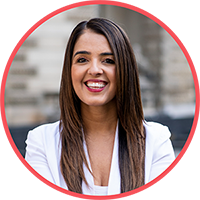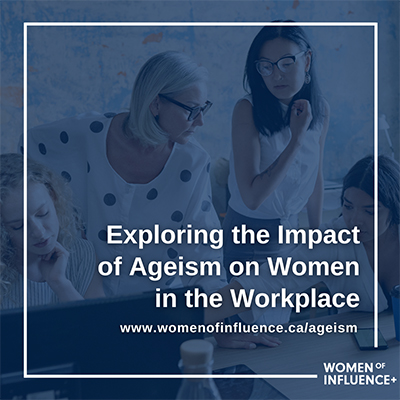Following release of their comprehensive survey on ageism and women in the workplace, the HRPA sat down for a Q&A with Dr. Rumeet Billan, CEO of Women of Influence+, to discuss the report’s findings and her observations.
Here is the full report: Exploring the Impact of Ageism on Women in the Workplace.
Ageism is a form of discrimination and prejudice based on age. It can affect individuals at every age and stage of their career and is present across a wide variety of industries and sectors. This bias leads to the stereotyping and generalizing of people based on their age, overlooking their actual abilities and personal qualities. Ageism is an issue that can lead to unequal treatment, restrict opportunities, and cause marginalization, impacting professionals from entry-level positions to those in senior roles. This social construct undermines the value of diversity in experiences and perspectives, hindering inclusive and fair workplace environments.
Our survey, Exploring the Impact of Ageism on Women in the Workplace, heard from more than 1,250 self-identifying working women from all demographics and industries. Through their responses, we uncovered how respondents’ personal and professional lives have been impacted by age-based discrimination.
According to our findings, nearly 80 per cent (77.8 per cent) of women have experienced ageism in their careers, highlighting this issue as an overlooked but critically important form of discrimination that needs to be addressed in the workplace.
Women experienced ageism at all stages of their careers — with alarming peaks during specific decades of work experience. For example, 40.7 per cent of respondents experienced age-based discrimination within the first decade of their professional journey, and 55.9 per cent encountered ageism after more than 21 years of being in the workforce. Additionally, respondents shared that ageism is being perpetrated by individuals across all levels of seniority in the workplace — including HR professionals — and the majority of the perpetrators also identify as men.
Outside how they have been impacted professionally, many women shared how ageism has impacted them personally: 55 per cent reported experiencing lower self-confidence, 62.1 per cent reported an increase in stress, and 59.3 per cent reported having to overcompensate or work harder to prove their value.
The data clearly shows a persistent bias regarding women’s potential and capabilities in the workplace, with age-based limitations significantly undermining what they are perceived to be able to achieve.
Experiencing ageism becomes even more challenging when it intersects with other aspects of a person’s identity, such as race, ability, and gender. Of all the respondents surveyed, 69.2 per cent believe that ageism disproportionately affects women. One respondent shared, “Ageism is so intertwined with sexism, so it is hard to separate the two.”
Women are not immune to ageism regardless of their career stage or level of experience, women are vulnerable to age-based discrimination. What is also most surprising is the paradox women find themselves in professionally: if they are deemed too young, they are inexperienced and, therefore, “not ready” for certain roles, projects, or responsibilities. One respondent shares, “On many occasions, I have been told that I am too young to understand issues properly or to be able to execute my work due to lack of experience.”
If a woman is considered to be too old, it is assumed that they have had enough experience. One respondent notes, “With 30-plus years of work experience, I am often overlooked or ignored for high-profile special projects within my department. Those projects are given to younger people ‘building their careers’.”
Not surprisingly, if a woman finds herself somewhere in the middle in terms of age and career experience, there are questions about whether she will be around to commit to her role or if she will prioritize having children. One respondent shared, “I can’t be considered for the director’s position because I’d be busy raising a family and wouldn’t have time to dedicate to the company.”
At the end of the study, clear calls to action for organizations are outlined by respondents. HR professionals can support women and their organizations by taking action in the following three areas:
- Raise awareness and provide training and education. By first accepting it as a real issue that significantly impacts women and organizations, HR professionals can help bring more awareness around ageism by facilitating anti-bias training and raising awareness to educate employees. HR professionals can also work with other colleagues to include ageism as part of their DEI programs, strategies, and initiatives.
- Implement preventative policies and hold people accountable. Once you know how harmful ageism can be, HR employees should consider this form of discrimination to be just as detrimental as other types of discrimination. An important step in combatting ageism is to create policies and adhere to them. It is important to ensure that the policy applies to all employees at all levels of seniority as well.
- Focus on competencies over age when recruiting and hiring. When looking for and retaining talent, it is vitally important to prioritize the employee’s skill set and what they are capable of instead of allowing their age to dictate what role, project, or responsibilities may suit them best.
For the full list of recommendations, please visit www.womenofinfluence.ca/ageism.
 Dr. Rumeet Billan is an award-winning, internationally recognized entrepreneur, learning architect, author and humanitarian. Her mission is to transform workplace cultures through research, training and experiences that enable trust, foster belonging and build resilience.
Dr. Rumeet Billan is an award-winning, internationally recognized entrepreneur, learning architect, author and humanitarian. Her mission is to transform workplace cultures through research, training and experiences that enable trust, foster belonging and build resilience.
Dr. Billan is the CEO and owner of Women of Influence, and President and CEO of Viewpoint Leadership. She completed her PhD at the University of Toronto and has designed and facilitated programs, courses and training sessions across industries and sectors. She twice led the ground-breaking research study on Tall Poppy Syndrome which reveals the impact of the silent systemic syndrome on women in the workplace. In 2020, she co-led the Canadian Happiness at Work study, in partnership with the Canadian Mental Health Association.
Dr. Billan was named a Top 10 Power Women in 2020, and she released her first award-winning and bestselling book, Who Do I Want To Become?, designed for children and adults who are struggling with the question of what they want to be when they grow up. She also serves on the Board of Directors of First Book Canada. Learn more about her at www.rumeet.com.
